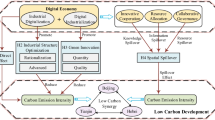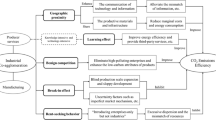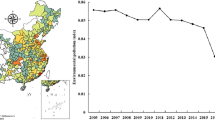Abstract
This study considers the implementation of the “Broadband China” strategy as an exogenous policy shock and examines the impact of network infrastructure construction (NIC) on the low-carbon innovation (LCI) of enterprises and its underlying mechanisms by using a progressive difference-in-difference model based on the data of Chinese listed enterprises from 2009 to 2020. This study finds that NIC can improve the LCI of enterprises. After the elimination of the sample selection bias and selection of the urban slope as the exogenous instrumental variable, the conclusions remained robust. The results of the mechanism test show that upgrading the human capital level, reducing transaction costs, and alleviating financing constraints are the three important paths through which NIC can help enterprises improve their LCI level. The heterogeneity analysis determines that NIC has considerable comparative advantages for enterprises with executives who have a financial background and enterprises with high knowledge stock. In addition, LCI improvement can further enhance enterprise value. The research conclusions can broaden the microscopic research perspective of enterprise transformation and upgrading theory and provide reliable empirical evidence for China’s low-carbon economic transformation.
Similar content being viewed by others
Data availability
Data are available on request.
References
Akcigit U, Caicedo SS, Miguelez E et al (2018) Dancing with the stars: innovation through interactions. CEPR Discussion Papers 12819
Bergek A, Berggren C (2014) The impact of environmental policy instruments on innovation: a review of energy and automotive industry studies. Ecol Econ 106:112–123
Brynjolfsson E, Yu JH, Simester D (2011) Goodbye pareto principle, hello long tail: the effect of search costs on the concentration of product sales. Manage Sci 57(8):1373–1386
Calel R, Dechezleprêtre A (2016) Environmental policy and directed technological change: evidence from the European carbon market. Rev Econ Stat 98:173–191
Chen H, Liu DX (2018) Study on the driving forces of low-carbon innovation behavior of resource-oriented enterprises—based on multiple case rooted analysis of coal related enterprises. Soft Science 32(8):63–97
Coase RH (2013) The problem of social cost. J Law Econ 56(4):837–877
Cohen WM, Levinthal DA (1990) Absorptive capacity: a new perspective on learning and innovation. Adm Sci Q 35:128–152
Cui H, Zhu X, Wang H (2020) Collaborative innovation of low-carbon technology from the triple helix perspective: exploring critical success factors based on DEMATEL-ISM. Pol J Environ Stud 29:1579–1592
Cunico E, Cirani CBS, Lopes EL (2017) Eco-innovation and technological cooperation in cassava processing companies: structural equation modeling. Rev Administrao 52(1):36–46
Glenn G, Ellison SF (2005) Lessons about markets from the internet. J Econ Perspect 19:139–158
Hadlock CJ, Pierce JR (2010) New evidence on measuring financial constraints: moving beyond the KZ index. Rev Financ Stud 23:1909–1940
Hong JJ, Shi FY, Zheng YH (2023) Does network infrastructure construction reduce energy intensity? Based on the “Broadband China” strategy. Technol Forecast Soc Chang 190:122437
Hu S, Yu YZ (2022) Digital economy and enterprise innovation: breakthrough innovation or progressive innovation? Res Financial Econ Iss 1:42–51
Huang J, Chen Y, Zhai HM (2011) The influence of corporate environmental ethics on sustainable development performance: the mediation role of proactive environmental management. Econ Manag J 104(3):361–370
Jacobson LS, Lalonde RJ, Sullivan D (1993) Earnings losses of displaced workers. Am Econ Rev 83:685–709
Jiang FX, Shi BB, Ma YB (2016) Information releasers’ financial experience and corporate financial constraints. Econ Res J 2016(6):83–97
Jin H, Wei JL (2021) Can network infrastructure construction realize the transformation and upgrading of enterprises: a quasi-natural experiment from the “Broadband China.” Ind Econ Res 6:73–86
Ju XS, Lu D, Yu YH (2013) Financing constraints, working capital management, and sustainability of enterprise innovation. Econ Res J 1:4–16
Li JC, Zhou MM (2017) Will the internet improve a country’s manufacturing export sophistication? Int Econ Trade Res 4:24–38
Li GH, Zhou XL (2021) Can promoting the digital economy improve environmental pollution in China: a quasi-natural experiment based on the “Broadband China” strategy. Macroeconomics 7:146–160
Li P, Lu Y, Wang J (2016) Does flattening government improve economic performance? Evidence from China. J Dev Econ 123:18–37
Li Q, Lu X, Zi W (2018) Model construction and practical exploration of low carbon innovation in typical chinese regions. Technol Manag Res 38:6–12
Liang L, Li Y (2023) How does government support promote digital economy development in China? The mediating role of regional innovation ecosystem resilience. Technol Forecast Soc Chang 188:122328
Lin WT, Shao BBM (2006) The business value of information technology and inputs substitution: the productivity paradox revisited. Decis Support Syst 42:493–507
Liu Z, Sun H (2021) Assessing the impact of emissions trading scheme on low-carbon technological innovation: evidence from China. Environ Impact Assess Rev 89:106589
Meng F, Han B (2018) Research on the motivation mechanism of low carbon technology innovation in equipment manufacturing enterprises based on evolutionary game theory. Projections 37:69–74
Moyukh L, Raja D (2023) A Steiner Tree based efficient network infrastructure design in 5G urban vehicular networks. Comput Commun 201:59–71
Okpalaoka CI (2023) Research on the digital economy: developing trends and future directions. Technol Forecast Soc Chang 193:122635
Peng XR, Wei J (2015) Stakeholder environmental orientation and corporate ecological innovation: the moderating effect of environmental awareness among executives. Stud Sci Sci 33(7):1109–1120
Qi SZ, Zhou CB, Li K, Li YK (2021) Influence of a pilot carbon trading policy on enterprises’ low-carbon innovation in China. Clim Pol 21:318–336
Shen GB, Yuan ZY (2020) The effect of enterprise internetization on innovation and export of Chinese enterprises. Econ Res J 1:33–48
Sun Y, Chen SX (2021) Data assets and high-quality development of technology service enterprises: a study based on “Broadband China” quasi-natural experiment. Wuhan Univ J(Philosophy & Social Science) 5:132–147
Teixidó J, Verde SF, Nicolli F (2019) The impact of the EU Emissions Trading System on low-carbon technological change: the empirical evidence. Ecol Econ 164:106347
Wan JX, Zhou J, Xiao Y (2020) Digital finance, financing constraints and enterprise innovation. Econ Rev 1:71–83
Wang W, Liu F (2016) Research on regional technological innovation and crossregional technology transfer under the transformation of low carbon economy. Southeastern Acad 1:68–78
Wang CY, Lan ZM, Zhang C (2020) High-speed railway construction, human capital migration and regional innovation. China Ind Econ 12:102–120
Wang HT, Qi SZ, Zhou CB, Huang XY, Zhou JJ (2022a) Green credit policy, government behavior and green innovation quality of enterprises. J Clean Prod 331:129834
Wang J, Song Y, Li M, Yuan C, Guo F (2022b) Study on low-carbon technology innovation strategies through government–university–enterprise cooperation under carbon trading policy. Sustainability 14:9381
Wu HM, Wu SJ, Chen H (2015) Urban Civilization, transaction costs, and the “fourth profit source” of enterprises. China Ind Econ 7:114–129
Yu W, Ramanathan R, Nath P (2017) Environmental pressures and performance: an analysis of the roles of environmental innovation strategy and marketing capability. Technol Forecast Soc Chang 117:160–169
Zhang X, Fan D (2021) Study on the path of China’s carbon emission trading mechanism and green credit system to support low-carbon technology innovation. Hubei Soc Sci 12:71–83
Zhang J, Fu K (2021) Can the construction of information network infrastructure drive the level of urban innovation? A quasi-natural experiment of “Broadband China” pilot policy. Ind Econ Res 5:1–14
Zhang X, Geng Y, Tong YW et al (2021) Spatial characteristics and its driving factors of low-carbon energy technology innovation in China: a gravity movement and exploratory spatial data analysis. J Clean Prod 295:126481
Zhang J, Wang K, Zhang Y (2022) Emission reduction effect of carbon trading mechanism - based on the mediating effect of low carbon technology innovation. Soft Sci 36:102–108
Zhou CB, Qi SZ (2022) Has the pilot carbon trading policy improved China’s green total factor energy efficiency? Energy Econ 114:106268
Zhou ZF, Li Y, Xiao T (2019) Carbon risk awareness, low-carbon innovation, and carbon performance. R&D Manag 31(3):72–83
Zhou CB, Sun ZX, Qi SZ, Li YK, Gao HY (2023) Green credit guideline and enterprise export green-sophistication. J Environ Manage 336:117648
Zhu J, Fan Y, Deng X, Xue L (2019) Low-carbon innovation induced by emissions trading in China. Nat Commun 10:4088
Funding
This paper is supported by Zhejiang Provincial Social Sciences Federation Research Project Achievement (no. 2024N077).
Author information
Authors and Affiliations
Contributions
Haikuo Zhang: conceptualization; writing—original draft preparation; methodology; and writing—review and editing. Yuankun Li: data curation; formal analysis; and writing—original draft preparation.
Corresponding author
Ethics declarations
Ethics approval
Not applicable.
Consent to participate
All authors participated in the process of draft completion. All authors have read and agreed to the published version of the manuscript.
Consent for publication
All authors agree to publish.
Competing interests
The authors declare no competing interests.
Additional information
Responsible Editor: Philippe Garrigues
Publisher's Note
Springer Nature remains neutral with regard to jurisdictional claims in published maps and institutional affiliations.
Rights and permissions
Springer Nature or its licensor (e.g. a society or other partner) holds exclusive rights to this article under a publishing agreement with the author(s) or other rightsholder(s); author self-archiving of the accepted manuscript version of this article is solely governed by the terms of such publishing agreement and applicable law.
About this article
Cite this article
Zhang, H., Li, Y. Can network infrastructure construction improve the low-carbon innovation of Chinese enterprises?. Environ Sci Pollut Res 30, 106355–106365 (2023). https://doi.org/10.1007/s11356-023-29916-5
Received:
Accepted:
Published:
Issue Date:
DOI: https://doi.org/10.1007/s11356-023-29916-5




